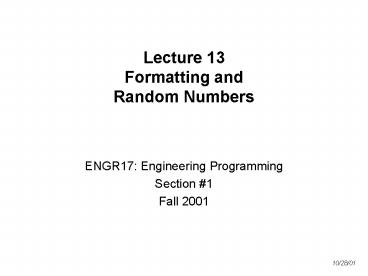Lecture 13 Formatting and Random Numbers - PowerPoint PPT Presentation
1 / 14
Title:
Lecture 13 Formatting and Random Numbers
Description:
There are built-in C/C functions for creating random numbers in a program (rand and srand) ... numbers the srand and rand create are actually related through ... – PowerPoint PPT presentation
Number of Views:60
Avg rating:3.0/5.0
Title: Lecture 13 Formatting and Random Numbers
1
Lecture 13Formatting andRandom Numbers
- ENGR17 Engineering Programming
- Section 1
- Fall 2001
10/28/01
2
Outline
- Formatting output
- Generate random numbers using
- srand
- rand
- time
3
Formatting Output
- C Stream Manipulators
- setprecision ( )
- Specify number of decimal places to display in
the outputs numbers - Syntax setprecision(number)
- setiosflags( )
- Used to control format of the numeric output
- Syntax setiosflags(formatflag)
- setw( )
- Set width of the output field
- setfill( )
- Set fill character
- Both manipulators are defined in a header file
named include ltiomanip.hgt - See programming manuals for details
4
Formatting Example
- include ltiostream.hgt
- include ltiomanip.hgt
- void main()
- int number 12
- float real (float) 12.345
- cout ltlt "1234567890\n"
- cout ltlt number ltlt "lt-\n"
- cout ltlt setw(5) ltlt number ltlt "lt-\n"
- cout ltlt setw(5) ltlt setfill('') ltlt number ltlt
"lt-\n" - cout ltlt setiosflags(iosshowposiosleft) ltlt
setw(5) ltlt number ltlt "lt-\n" - cout ltlt real ltlt "lt-\n"
- cout ltlt setprecision(1) ltlt setiosflags(iosfixed
) ltlt real - ltlt "lt-\n"
- cout ltlt setiosflags(iosscientific) ltlt real ltlt
"lt-\n"
5
Formatting Example
Screen Output
1234567890 12lt- 12lt- 12lt- 12lt- 12.345lt-
12.3lt- 1e001lt- Press any key to continue
There wont be a question on formatting on any of
the tests.
6
The displayPrices Function
7
Generating Random Numbers
- Ideally, a random number generator can produce a
sequence of completely unrelated numbers - Since a computer is by nature deterministic,
creating truly random numbers is very difficult
(if not impossible) - There are built-in C/C functions for creating
random numbers in a program (rand and srand) - However, the built-in functions are extremely
poor at creating truly random numbers - The numbers the srand and rand create are
actually related through a fairly simple
algorithm - But, for most everyday applications, its ok
- Keep in mind that many other random number
generators exist that are much better than the
built-in functions
8
rand Function
- Produces the random numbers
- Also referred to as the random number generator
- Generates integers from 0 through RAND_MAX
- Syntax rand()
- Defined in ltstdlib.hgt
9
srand Function
- Initializes the random number generator
- Syntax srand(seed)
- time function typically used as the seed
- Syntax for using the time function as the seed
for the srand function time(NULL) - srand is defined in ltstdlib.hgt
- time is defined in lttime.hgt
10
getRandomNumbers Function
- Write a function that generates two random
numbers, which should be stored in the firstNum
and secondNum variables - Pass in a variable called level that serves the
following function - If level1, then generate random numbers between
1 and 10 - Otherwise, generate random numbers between 10 and
100 - This type of function would be very useful in a
game program
11
Generating Random Numbers
12
Summary
- Formatting output streams
- Generating random numbers
13
Example
- Write a function to fill a 1D array with random
numbers from 0 to 99 - The array itself and the size of the array are
passed to the function
14
Code
- include ltiostream.hgt
- include ltstdlib.hgt
- include lttime.hgt
- void fillArray(int nums, int size)
- void main()
- int nums20
- int size20
- int i
- fillArray(nums, size)
- for(i0 iltsize i)
- cout ltlt numsi ltlt endl
- void fillArray(int nums, int size)
- int i
- srand(time(NULL))
- for (i0 iltsize i)































